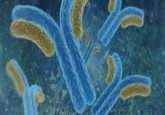Gene promoting invasive switch in pancreatic tumorigenesis identified

A study carried out at the University of Michigan Comprehensive Cancer Center (MI, USA) has identified a gene involved in the development of pancreatic ductal adenocarcinoma (PDA). The research, published recently in Genes and Development, may explain why less than one third of patients survive even the early stages of the disease.
The researchers pinpointed a gene that is known to be active in 90% of pancreatic cancers and determined that it promotes the development and spread of the disease. The gene, termed ATDC, plays a key role in the progression of tumors from a preinvasive state to an invasive cancer, and finally to metastatic cancer.
“We know that patients with the earliest stage of pancreatic cancer have a survival rate of only 30%. This suggests that even in that very early stage of invasive cancer there are already cells that have spread to distant parts of the body,” explained Diane M Simeone from the University of Michigan Comprehensive Cancer Center. “This study sheds important light on what it is about pancreatic cancer that makes it so aggressive early in the game.”
Researchers utilized a PDA mouse model to replicate human pancreatic cancer and also studied samples of both cancer tissue and preinvasive pancreatic lesions. They found ATDC expressed in a subset of preinvasive cells and discovered that it played a role in the development of pancreatic cancer stem cells, suggesting that the gene is responsible for promoting a tumor’s invasiveness and spread early in the disease.
The preliminary data also suggest that ATDC may play a role in other cancer types, such as bladder, ovarian, colorectal and lung cancers and multiple myeloma. However, Simeone notes that there is an urgent need to find new treatment options for pancreatic cancer as it is expected to become the second-leading cause of cancer death in the US by 2030.
Finally, the Michigan team believes that ATDC may be a potent drug target. There are currently no drugs that target this pathway, as the crystal structure of the protein has yet to be understood. Simeone’s team, in collaboration with the University of Michigan Center for Structural Biology, have now made crystals of the protein and begun to create a three-dimensional structure that they can use as a model for drug development going forward.
Sources: Wang L, Yang H, Abel EV et al. ATDC induces an invasive switch in KRAS-induced pancreatic tumorigenesis. Genes & Dev. 29, 171–183 doi: 10.1101/gad.253591.114 (2015) [Epub ahead of print]; University of Michigan Health System press release




